
Don’t Let Writers Stand Alone – All Media Workers Should Join the WGA on Strike!
(December 2007).
click on photo for article

Militant Protest Against Racist Cop
Attack on Bay Area Longshore Workers (October 2007).
click
on photo for article
June 2008
Despite Setbacks They’re Still Ready to Fight
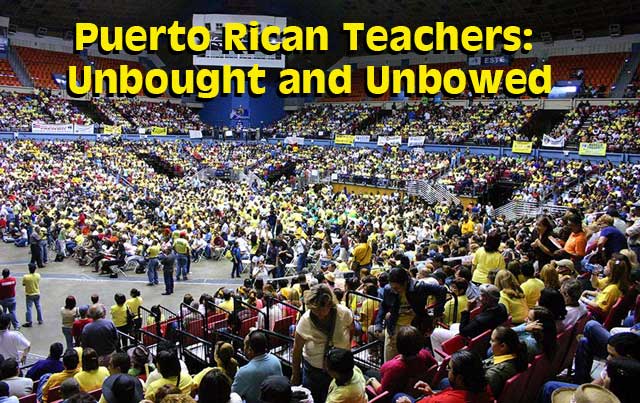
Combative FMPR union assembly on March 5 of more than 10,000 voted to return to work.
(Photo: CMI Puerto Rico)
The
two-week strike by Puerto Rican teachers was a historic event, in open
defiance
of Law 45, a ruthless piece of anti-union legislation that outlaws
strikes,
work stoppages or even voting for such labor action. From the beginning
of the
walkout on February 20 to the decision to return to the classrooms,
approved by
a giant assembly on March 5 with some 10,000 union members
participating, the
action by the Federation of Puerto Rican Teachers (FMPR) threw the
island into
turmoil. The FMPR, representing some 42,000 educators, dared to break
the
prohibition decreed by the colonial capitalist rulers. In doing so,
they blazed
the way for all Puerto Rican workers.
There
were pickets at hundreds of the 1,500 schools, classrooms were emptied:
up to
three-quarters of the students didn’t attend school. There were
dramatic scenes
of women teachers with shields confronting the Fuerza de Choque (Shock
Force)
of the Puerto Rican Police. There were scores of picket-line arrests.
These
fighters decidedly did not act as victims, but rather as
protagonists in
the fight for justice. Those in charge of the Puerto Rican educational
system
can no longer delude themselves that they have a submissive workforce.
The
strikers confronted an unholy alliance of enemies which extended from a
governor under investigation for corruption and his arrogant secretary
of
education to the “dues-sucking” union leaders of the SEIU (the U.S.
Service
Employees International Union) who shamefully took the side of the
employer.
While the teachers were forced to declare a “recess” of the strike –
that is,
to call it off – it was because the bosses’ intimidation tactics were
having an
effect on part of the membership, and because the FMPR found itself
alone,
without the active support of the rest of the workers movement.
The
government canceled the Federation’s legal certification as bargaining
agent
for the teachers. The Department of Education refused to sign a
contract or any
agreement. Even so, due to the pressure of the looming strike, the D.E.
decreed
a pay increase of $100 monthly, and a raise in the paltry base salary
to $1,750
a month; it formally renounced any effort to privatize public education
through
charter schools; it committed itself to maintaining established terms
of
employment and working conditions; and it refrained from taking
measures
against the strikers for violating Law 45.
The
Federation was able to retreat in an orderly way, “with their heads
held high
and with no reprisals,” as the union publication Páginas
Sindicales
(April 2008) put it. In the face of the decertification of the union,
the
assembly on March 5 collected more than 7,000 signatures to deduct dues
for the
FMPR as a fraternal association (hermandad bonafides). The
teachers are
going though a difficult period, but the Federation did not renounce
the right
to go on strike, and the militancy of the union is unbroken.
The
educators of the FMPR gave a lesson to the entire workers movement of
Puerto
Rico and the United States. The heroic strikers deserve our admiration
and the
labor misleaders who stabbed them in the back should be despised by
every
trade-unionist with an ounce of dignity. Above all, it is necessary to
rearm
the FMPR and all Puerto Rican unions for all-out class struggle. Those
who hold
that the teachers’ strike should never have occurred think that you
have to
submit to the whip, that all resistance is hopeless. Many are cutting
deals
behind the backs of the workers in order to feather their nests. But
those who
fight to defeat the forces that would bury public education will seek
to turn
this strike experience into a school for class-struggle labor
education. As
Karl Marx wrote of the unions in his pamphlet, Value, Price and
Profit (1865):
“They fail generally from
limiting themselves to a guerilla war against the effects of the
existing
system, instead of simultaneously trying to change it, instead of using
their
organized forces as a lever for the final emancipation of the working
class,
that is to say, the ultimate abolition of the wages system.”
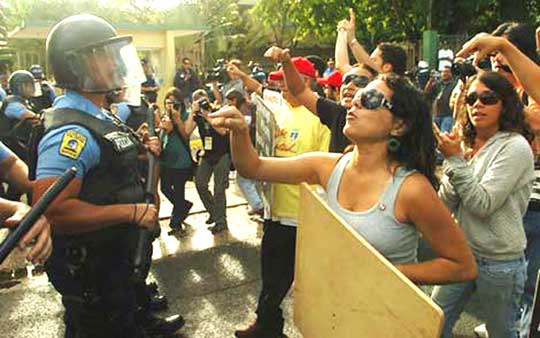
Strikers confront Shock Force riot cops outside the Miguel Such school in Río Piedras.
(Photo: Carlos Giusti/Primera Hora)
The
Internationalist Group and League for the Fourth International actively
supported the Puerto Rican teachers strike: denouncing the “labor
colonialism”
of U.S. union tops; publishing articles on the Internet and in
leaflets;
putting out a 12-page strike special, in English and Spanish, hundreds
of
copies of which were sold by our team that traveled to the island;
helping to
organize solidarity demonstrations in New York; helping to get
important
motions of solidarity from New York City unions; and obtaining
statements of
labor solidarity from the Bay Area to Mexico and Brazil. We also raised
key
issues to win this important battle, as well as criticisms of the
strategy
pursued by the union leadership. Now it is time to draw up a balance
sheet in
order to prepare for the coming battles.
From
the moment that seven thousand union members voted in a delegated
assembly last
November to authorize a strike, the Teachers Federation has been the
target of
an assault by the government of Aníbal Acevedo Vilá, of
the Popular Democratic
Party (PPD); by its Department of Education and its high-handed chief
Rafael
Aragunde; by a bourgeois press rabidly hostile to the FMPR; by a
handful of
union misleaders on the make who have been bribed with the dues money
assured
to them under Law 45, so long as there is no fight for the interests of
the
members; by some ex-leaders of the Federation who have sold out; and by
the
would-be king of the “dues-sucking” bureaucrats, Dennis Rivera, head of
the
health workers sector of the SEIU.
We
have reported in a separate article on the shameful campaign against
the FMPR
by the American Federation of Teachers (AFT), which went to the federal
courts
in 2004 in a vain attempt to stop the disaffiliation of the Puerto
Rican union,
or, failing that, to seize its assets (see “A Case of Labor
Colonialism:
AFL-CIO and Change to Win vs. the FMPR,” on page 59). We also worked
with FMPR
members and supporters to overcome this, and together were successful
in
getting through motions of solidarity from the United Federation of
Teachers
(UFT) and Professional Staff Congress (PSC) in New York, despite
resistance
stemming from the fact that both are part of the AFT (which is more
like a
subsidiary of the UFT). Others worked to reach unionists in Local 1199
and
other SEIU affiliates. This showed that real labor solidarity between
U.S. and
Puerto Rican unionists is possible, despite the pro-imperialist
politics of the
union tops.
But
the fundamental battle was taking place on the ground in Puerto Rico.
The
strikers showed great courage and determination. The shock troops of
Pedro
Toledo’s Puerto Rican Police dragged off women teachers by the hair.
Campuses
of the University of Puerto Rico carried out a one-day stoppage,
although far
too late in the strike, while leftist students and faculty unionists
played an
active role on the picket line. But as the strike dragged on with no
end in
sight, the number of teachers actively participating began to drop
sharply.
A
balance sheet of the strike in the union’s Páginas Sindicales
(April
2008) by the FMPR’s secretary of union education, Luis Angel Torres,
reported
that active support for the strike (either by picketing or staying
home) was
down from 60 percent of the teachers at the start to 50 percent after
seven
days and was dropping to one-third, “showing that the strike process
was
deteriorating and the end of the strike was near.” With under half of
the
workforce participating, the strike was unsustainable, and a return to
work was
unavoidable. The only question was whether it would be ragged or with a
show of
force, which the union achieved, showing that it had the determined
support of
thousands of teachers, even in difficult straits. But these figures
reveal real
weaknesses and errors in preparing the struggle.
Although
the union had said that there were hundreds of strike committees in
schools
around the island, in many cases these were too weak to sustain a
hard-fought
struggle. It is certainly relevant, as Torres noted, that “the lack of
strike
experience had its effect on a majority of the picket lines, since
strikebreakers were permitted to enter freely, without resistance by
the
strikers.” But that also shows that there was insufficient preparation
by the
union leadership. If “the majority of the membership prepared for a
short-lived
strike,” that means that the FMPR leaders either expected the same, or
did not
ensure that the ranks understood what was involved in real terms. Since
it was
a struggle just to call the strike in the first place, such
deficiencies may be
understandable, but they can be fatal – and in this case they were.
The
colonial government lined up its labor finks, made some concessions,
organized
scabherding, and brought out the police in force. The bosses were
prepared for
a knock-down, drag-out battle and the union ranks were not, at least
not
sufficiently. And though the teachers fought valiantly, that inadequate
preparation is the fault of the leadership. Of course, defeatists,
scabs and
other scum will seize on this to argue that the teachers should not
have
struck. Those voices of despair are echoing the bosses’ propaganda. But
serious
labor militants – and teachers who want to get out of poverty and teach
in
well-maintained and equipped schools, where students can learn instead
of being
warehoused in run-down, rat-infested barracks – will understand that it
is
necessary to learn from the mistakes in order to really sock it to the
bosses
in the next round.
The
fact that the return to work was not a debilitating defeat, that
teachers were
able to go back without reprisals, with their fighting spirit unbroken,
that
they were able to force some concessions with the threat of a strike –
all this
shows that the struggle was worth it. Yet it is a mistake to try to
present the
outcome of the strike as a victory, as some FMPR supporters have done,
or to
talk of “agreements” achieved by the strike, as the FMPR leadership has
done,
when in reality the outcome was a setback. These weren’t
agreements, but
rather unilateral decrees by the employer – under pressure from the
combative
union. And the FMPR was decertified, leaving the teachers without union
representation. It is necessary to combat a mood of disappointment, but
prettifying the result doesn’t help – it doesn’t fool anyone, and it
doesn’t
prepare the membership to do better.
Beyond
the evaluation by the FMPR leaders, there are several issues they did
not
raise. Working-class parents were not really organized to actively
participate
in the strike. A “Broad Front to Support the FMPR” was announced at the
last
minute, but this was simply a vehicle for bourgeois politicians and
various
labor and community leaders to declare their sympathy and portray the
teachers’
action as a “strike of the people” rather than a vehicle to mobilize
working-class and poor neighborhoods in support of teachers in the
local
schools. We called to “turn the strike committees into enormous
community
centers of the working people.” Hold strike education on the picket
lines.
Having large numbers of students and parents in the street in front of
the
schools would have solidified support, enormously disrupted traffic and
public
life, and made it extremely difficult to bring in scabs. But it would
have
taken months of preparation.
But
a key issue FMPR leaders have not emphasized is the fact that the
Federation
stood alone against the onslaught of the government and virtually the
entire
bourgeoisie. To be sure, they mention the “enthusiastic cooperation”
with the
state from “dues-sucking unions,” “independentista sectors
allied with
the populares” (the PPD), and ex-leaders of the FMPR. But they
don’t
mention the criminal lack of mobilization by their friends in the
historically
militant unions, in particular the UTIER electrical workers and
secondarily the
UIA water workers. With teachers being clubbed by the Fuerza de Choque
riot
police, there should have been mass labor marches blocking the streets
of the
capital. They could have thrown the switch to plunge governmental
offices into
darkness (and shut down the air conditioners and computers). In our 14
February Internationalist article, “Puerto Rico: All Out to
Defend
the Teachers’
Struggle!” we wrote: “In a hard strike, a fighting ‘triple alliance’ of
the
FMPR, UTIER and UIA could be key to winning.”
It
didn’t happen, even though leaders of the UTIER are members of the same
Movimiento Socialista de Trabajadores (MST – Socialist Workers
Movement) as
are FMPR leader Rafael Feliciano and others in the CODEMI (Commitment,
Democracy, Militancy) caucus that leads the teachers union. Their own
comrades
abandoned them. And a common struggle against the government was
eminently
possible. On February 15, a week before the teachers struck,
representatives of
the electrical authority arrogantly walked out of negotiations with the
UTIER.
On February 17, the UIA demonstrated over the refusal of the Water and
Sewage
Authority to carry out the contract. The union president even
threatened to
call a strike vote. Moreover, neither the UTIER and UIA are covered
under Law
45, so that even legally it was far easier for them to strike. But they
didn’t.
Why?
Many,
if not most, union struggles that go down to defeat these days are sold
out by
the union leadership. This is particularly true in the period since the
late
1970s as the bourgeoisie launched a full-scale assault on the unions
and the
Soviet Union, leading to the counterrevolutionary destruction of the
USSR and
the bureaucratically deformed workers states of East Europe. Since
then, many
erstwhile socialists have given up the ghost, and many labor leaders
actively
go along with the destruction of hard-fought union gains, at most
trying to
slow down the process when they aren’t actually seeking to profit off
of
privatization deals. It happens so often that denouncing union tops for
selling
out almost becomes routine.
In
this case, the Puerto Rican teachers strike was not sold out,
yet it
ended in a setback. The union leadership organized mass picket lines in
a
number of locations, not the token or toothless “informational” pickets
so
common today; it held out until the strike was no longer sustainable;
it didn’t
abandon its key demands; it didn’t accept a rotten deal; it didn’t
agree to
disciplinary actions, or renounce the right to strike – and yet the
bosses won
this round. How did this come about? And how can it be avoided next
time
around?
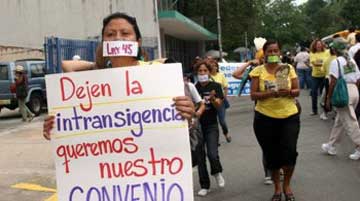 Teachers protest anti-union gag law which
outlaws even
discussing strike action. (Photo: Coordinadora
Sindical)
Teachers protest anti-union gag law which
outlaws even
discussing strike action. (Photo: Coordinadora
Sindical)
In
the first place, the teachers union leaders, while they broke the
no-strike Law
45, continued to play by the bosses’ rules. In deciding on union
representation, they go through the procedures of capitalist labor
legislation,
whose purpose is to enforce ultimate government control of the unions.
Whether
or not to participate in such rigged votes (in which management
blatantly tries
to intimidate the workers with threats of firings and discrimination)
is a
tactical issue, but a class-struggle union leadership would know that
to win it
must enforce its right to represent the workers in action. Also, rather
than
forthrightly calling to rip up Law 45, the FMPR leaders sought only to
reform
it. Yet class-struggle unionists oppose all capitalist legislation
regulating
unions (as opposed to workplace safety laws and the like), and reject
all court intervention into the affairs of the workers movement.
Secondly,
the FMPR leadership did not wage a political struggle against
the
government, the colonial rulers and the capitalist class. While
opposing the
PPD government and the PNP (New Progressive Party) opposition, it
allied
closely with the Puerto Rican Independence Party (PIP), a secondary
capitalist
party linked to the social-democratic Second International. The PIP
claims to
be for independence, although it is actually for a negotiated
“association”
with Yankee imperialism, including leaving the numerous U.S. military
bases on
the island. It often adopts a more “militant” stance: thus its leaders
got
themselves arrested during protests over the Navy bombing range on
Vieques
Island (as did Dennis Rivera). But the PIP also did not call for repeal
of the
no-strike Law 45, only for its modification. Although it poses as a
“friend of
labor,” as a bourgeois party it wants to keep the unions under the
thumb of the
capitalist state.
A
communist union leadership would have fought during the strike to lay
the basis
for a revolutionary workers party. The MST regularly comes under heavy
red-baiting attack in the Puerto Rican press, as FMPR leader Feliciano
noted in
an April 4 talk at Hunter College in New York. His point was that he
didn’t
have to constantly identify himself as a socialist since the media does
it for
him, and thus everyone knows. But he treated this as a essentially a
private
matter: some union members are populares, others are penepés,
still others are pipiolos and he is a socialista. Yet
while a
union represents the entire membership, a class-struggle union
leadership
cannot be politically neutral.
This
is notably the case on the vital issue of Puerto Rican independence.
The MST
calls for independence of the Caribbean island nation, which has been
under the
U.S. boot since 1898. Puerto Rico was until recently the oldest and
largest
colony remaining in the world (it has since been replaced by Iraq and
Afghanistan, which have essentially become U.S. colonies). However,
faced with
the neighboring poverty-stricken countries such as Haiti and the
Dominican
Republic, a large majority of Puerto Ricans have voted for either
statehood or
maintaining the present colonial status disguised as a “commonwealth,”
as it is
vaguely called in English, or “free associated state,” as it is
deceptively
termed in Spanish.
The
MST has on various occasions called for “unity” of the “independentista
movement.” Yet the pro-independence MINH (National Hostosiano
Independence
Movement), successor to the petty-bourgeois nationalist socialists of
the
Puerto Rican Socialist Party (PSP), opposed the strike before it was
called,
and viciously denounced the FMPR leadership after it was over, accusing
the
union leadership of “monumental errors” and calling the union’s demand
that the
Department of Education sit down to negotiate “laughable” (Carlos
Gallisá, in a
commentary in Claridad, 20 March). This was no accident,
because as bourgeois
nationalists the MINH yearn to be the owners of “their own” patria (fatherland).
It
shouldn’t be surprising therefore, that the spokesman for Education
Secretary
Aragunde is a member of the strikebreaking management Association of
Puerto
Rican Teachers and a supporter of the MINH. Nor should it comes as a
surprise
that former PSPer Dennis Rivera has maintained ties with these
nationalists who
buzz like flies around the PPD administration of Governor Acevedo
Vilá. In
contrast, as proletarian internationalists, the Internationalist Group
and
League for the Fourth International stand for the unconditional
independence of
Puerto Rico and fight for a voluntary socialist federation of the
Caribbean, in
order to put an end to the national oppression of the Puerto Rican
people and
to expose the bourgeois and petty-bourgeois nationalists. Thus
Trotskyists
oppose political unity with independentistas such as the PIP
and MINH as
class collaboration.
This
leads to a third key point, that the Movimiento Socialista de los
Trabajadores
is not a Leninist vanguard party of the working class but rather a
loose
social-democratic formation. Since it angers MSTers when we say this,
let us
explain. First, we are not referring to the latter-day social democrats
like
Tony Blair’s “New Labour” in Britain who implement “neo-liberal”
privatization
policies, but a more classical type. In its statement, “What Is the MST
and
What Does It Fight For” (Bandera Roja, 21 April 2003), the MST
openly
proclaims its “Socialist-Democratic perspective.” It explicitly rejects
a
Leninist party governed by democratic centralism. This concept has been
deformed by the Stalinists, who imposed a bureaucratic
centralism on the
party ranks, in order to enforce its policies of class collaboration.
But any
tendency that seriously intends to wage sharp class battles requires a
disciplined party to lead them.
The
MST writes that the “crisis of Marxism” has manifested itself
particularly on
the question of party organization and has “highlighted the
contradictions of
the so-called Leninist theory of organization with the autonomous and
free
development of the workers struggles.” Where Leninist democratic
centralism
holds that after internal discussion, a minority must carry out the
decision of
the majority, the MST writes that “once a decision is taken, the
majority...must be the main ones responsible for putting it into
practice; the
minority (those who voted against) must have the option of complying
with it or
not.” This is pure social democracy, a party in which every current can
do what
it wishes – at least until pressures grow so intense that the party
bureaucracy
ends up throwing out the revolutionaries, or worse.
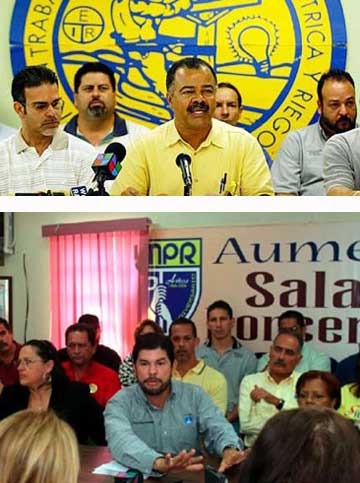 UTIER
leadership, headed by MSTer Ricardo Santos (above,
center) did not mobilize labor action in defense of FMPR, led by MSTer
Rafael Feliciano (below, center), as teachers faced heavy repression. (Photos: UTIER and
Coordinadora Sindical)
UTIER
leadership, headed by MSTer Ricardo Santos (above,
center) did not mobilize labor action in defense of FMPR, led by MSTer
Rafael Feliciano (below, center), as teachers faced heavy repression. (Photos: UTIER and
Coordinadora Sindical)
So
what about the “autonomous and free development of the workers
struggles”? We
have just seen what this means in practice. The FMPR teachers union led
by
MSTer Rafael Feliciano goes on strike against a no-strike law, facing
the full
weight of state repression, and the UTIER electrical workers led by
MSTer
Ricardo Santos sits on its hands, even though intervention by the
electrical
workers could have decisively altered the outcome of the strike. Each
labor
group goes its own way, because “the organization should not require
anyone,
under the threat of disciplinary measures, to obey a decision which
would
injure principles of conscience.” If so, on what basis can the union
require
that its members not scab on a strike?
This
also concerns the crucial question of class consciousness. In his
balance
sheet, Luis Angel Torres writes that a main reason the strike did not
win a
contract was “the state of class consciousness of the educational
workers.”
This is certainly a key factor, and it is also certain that “the
teachers strike
was a massive pedagogical experience.” Yet as Lenin insisted in What
Is To
Be Done? it is the revolutionary party that must bring
socialist
consciousness to the working masses, for otherwise they cannot go
beyond
the trade-union consciousness that grows out of their day-to-day
existence and
struggles. Blaming the ranks for the lack of clear class consciousness
is
ducking the responsibility of the leadership.
So
the teachers union did not sell out, yet it still suffered a loss. That
is
related to a more general issue, namely the fate of labor struggles and
unions
in the present era. This question was addressed by Leon Trotsky in an
essay he
was working on when he was murdered by a Stalinist assassin in August
1940. In
the unfinished but extremely rich manuscript he left, published under
the title
“Trade Unions in the Epoch of Imperialist Decay,” the co-leader of the
Russian
October Revolution wrote:
“In other words, the trade
unions in the present epoch cannot simply be the organs of democracy as
they
were in the epoch of free capitalism and they cannot any longer remain
politically neutral, that is, limit themselves to serving the daily
needs of
the working class. They cannot any longer be anarchistic, i.e. ignore
the
decisive influence of the state on the life of peoples and classes.
They can no
longer be reformist, because the objective conditions leave no room for
any
serious and lasting reforms. The trade unions of our time can either
serve as
secondary instruments of imperialist capitalism for the subordination
and
disciplining of workers and for obstructing the revolution, or, on the
contrary, the trade unions can become the instruments of the
revolutionary
movement of the proletariat.”
Trotsky comes back to
this point over and over, treating it from various angles. Thus he
writes:
“As a matter of fact, the
independence of trade unions in the class sense, in their relations to
the
bourgeois state can, in the present conditions, be assured only by a
completely
revolutionary leadership, that is, the leadership of the Fourth
International.
This leadership, naturally, must and can be rational and assure the
unions the
maximum of democracy conceivable under the present concrete conditions.
But
without the political leadership of the Fourth International the
independence
of the trade unions is impossible.”
Many
ostensibly Trotskyist outfits treat this as pious wishes, then turn
around and
make political blocs with all sorts of reformist out-bureaucrats that
guarantee
that once in office they will act like their predecessors. But Trotsky
was
making a fundamental point. In this period where union gains are being
chewed
up left and right, as the standard of living of the working class is
systematically driven down, “the objective conditions leave no room for
any
serious and lasting reforms.” In fighting to defend its very existence,
the
proletariat cannot succeed using the old methods of reformist labor
struggle. This
was just shown in Puerto Rico, where the teachers fought with all their
hearts,
they weren’t sold out, but they couldn’t prevail because they were
only
prepared for a traditional (reformist) labor struggle while the bosses
were
waging class war.
This
is the second major labor battle in Puerto Rico in recent years, the
first
being the general strike of 1998. For our analysis of that strike,
which was
sold out with a handshake between a union leader and top cop Toledo on
the road
to the San Juan airport as the mass picket was called off, see our
“Balance
Sheet of the General Strike: Puerto Rican Workers Mobilize, Union Tops
Cave
In,” in The Internationalist No. 6, November-December 2006. We
encourage
revolutionary-minded militants in Puerto Rico to study Trotsky’s essay
on the
unions. The Internationalist Group and League for the Fourth
International
uphold the need to build a revolutionary workers party based on the
principles
and program of Lenin and Trotsky in order to provide the leadership the
class struggle
requires in this epoch. In quiet times, this may seem like preaching in
the
wilderness, but in every hard class battle, it is dramatically
confirmed.
The
urgent need to build the Leninist-Trotskyist world party of socialist
revolution, a reforged Fourth International, is the central lesson of
the
Puerto Rican teachers strike. n
See also: A Case of Labor Colonialism: AFL-CIO & CTW vs. the FMPR (7 February 2008)
Puerto Rico: All Out to Defend the Teachers’ Struggle! (14 February 2008)
Tens of Thousands March in Puerto Rico on Eve of Teachers Strike (18 February 2008)
To contact the League for the Fourth International or its sections, send an e-mail to: internationalistgroup@msn.com
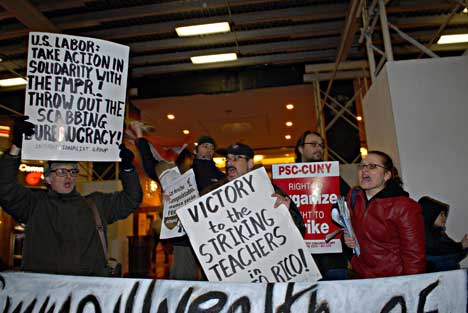 On March 5, the Delegate Assembly of New York
City's
United Federation of Teachers (UFT) declared its solidarity with the
striking
teachers in Puerto Rico. Close to 1,000 delegates voted for a motion
calling to
On March 5, the Delegate Assembly of New York
City's
United Federation of Teachers (UFT) declared its solidarity with the
striking
teachers in Puerto Rico. Close to 1,000 delegates voted for a motion
calling to